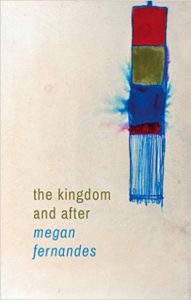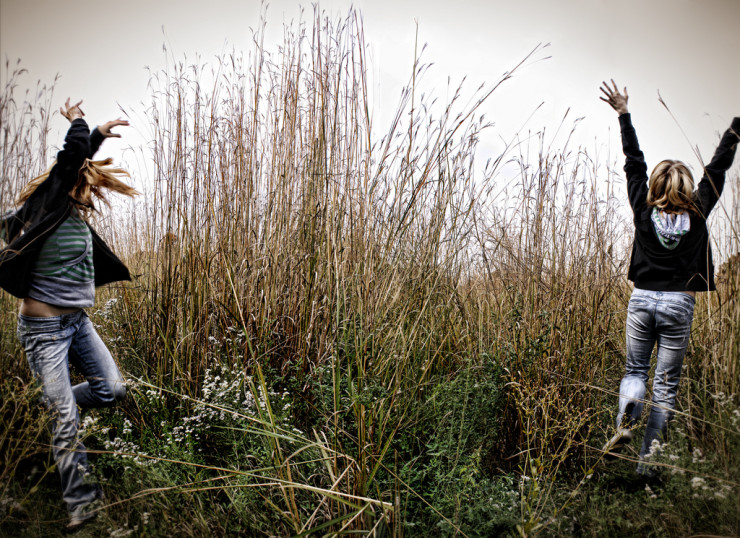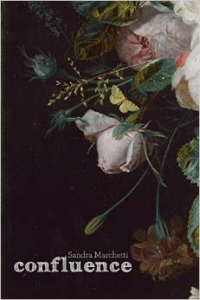I read some poetry collections that are enjoyable and well crafted but soon disappear in the far reaches of memory. I suppose that’s a nice way of saying they are enjoyable in the moment but not terribly memorable. And then there are other collections, by poets who use words that are almost jagged, sharp points that tear and shred preconceived notions and force you to consider something in an entirely different way. The result can be unsettling.
Meet Megan Fernandes and Sandra Marchetti.
Megan Fernandes is the poetry editor of the anthology Strangers in Paris and the author of two chapbooks, Organ Speech and Some Citrus Makes Me Blue. Her poems have been published in Boston Review, Guernica, Rattle, and other publications, and she’s received several grants and fellowships. With a Ph.D. degree in English from the University of California and an MFA in poetry from Boston University, she currently teaches at Concordia University in Montreal.
Her most recent collection, The Kingdom and After, is filled with poems about African countries, natural processes, even an airline flight. But it is her poems that refer to people, real and literary, that are the most arresting. The volume contains an intriguing series of prose poems about someone named Corinne, who “has blue eyebrows and a parakeet that tweets when she raises them, ” who expounds on physics, aging, and bodies of water in ways that seem to make everything about Corinne.
Then there is this, perhaps my favorite poem in the entire collection, tackling a character in one of my favorite novels, William Faulkner’s The Sound and the Fury:

You won’t have allergies here.
The flowers are made of glass,
your little spine will become a maple tree.
The orchids, posing like eavesdroppers—
they will make you their Queen.
We will make love on Russian glass,
pickled seeds, roots and stamens,
the translucent xylem of the flowers
pricking our spines.
Couldn’t you die here?
Don’t speak of Father.
Look to the cashew trees.
Remember the wild orchids in the New England wood?
Their veiny leaves and cuticles fresh with vanilla.
These are not fresh, but they inhale.
They can smell your minty breath,
they can bow to your sighs,
they will make soil of your shoulders
and grow you arms.
Caddy, surrounded by glass.
Caddy, surrounded by glass, a little tree inside her.
Caddy, surrounded by glass, smells like trees.
Couldn’t you die here, Caddy?
In all this glass?
Then there is poet Sandra Marchetti.
Marchetti received her MFA degree in creative writing from George Mason University. A collection of her essays and poems, A Detail in the Landscape, was published in 2014. Her first chapbook, The Canopy, was published in 2012. Her poems have been published in Blackbird, Sugar House Review, Mid-American Review, South Dakota Review, and other journals. She is currently a writing instructor and manuscript editor near Chicago.
Her most recent collection is entitled Confluence, and a confluence it is, of memories and meditations on a wide array of subjects—seasons, storms, geography, birds, even lunch. I couldn’t name a favorite poem in the volume, but I could name five or six.
This is one of the standouts, about a park in Geneva, Illinois, and it includes an introduction that you should read after you read the poem:
We chased
the heron, the bridge,
a rafting concrete wave
hefted high.
My jaw dredged across
the watery flood blood—
green water and open
to receive me off
the bastion train track,
bust track—
a human’s perch,
a faction, a fraction—
to be untied,
and given to granite,
carved into a willing water.
A dressage of slipping rocks
braced for the fall.
Fleshed against
the sidewalls
of underwater
blood canyons,
our flexed muscles carve
cold tidal waves,
shredding skin,
making shifts of ice.
What’s young
comes lick-swift, dying
quick off the two-tiered bridge.
A loud past flinches
The nuclear edges.
Water lilies and
still-motioning swings:
this is the heron’s
pick-ground.
Here is the introduction: According to local legend, in the last century numerous suicide attempts have taken place off the railroad bridge in this Geneva, Illinois, park.
I never thought I could be so taken by a poem about suicides, but this one does it.
Megan Fernandes and Sandra Marchetti are two wonderful poets whom I hope to read more—a lot more—of.
Photo by Mysianne, Creative Commons, via Flickr. Post by Glynn Young, author of the novels Dancing Priest and A Light Shining, and Poetry at Work.
Browse more poetic voices
___________________________

“I require all our incoming poetry students—in the MFA I direct—to buy and read this book.”
—Jeanetta Calhoun Mish
- Longfellow’s “Paul Revere’s Ride”: Creating a National Legend - April 17, 2025
- Poets and Poems: Katie Kalisz and “Flu Season” - April 15, 2025
- Poets and Poems: Michelle Ortega and “When You Ask Me, Why Paris?” - April 10, 2025




[…] —Sandra Marchetti, from Confluence […]